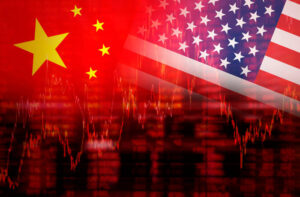China’s Economic Challenges vs. U.S. Recession Worries: Insights for Investors
As we navigate the complex landscape of global markets, the discourse surrounding economic performance in China and the United States is more pertinent than ever. At Extreme Investor Network, we’re committed to providing you with unique insights that go beyond the headlines, ensuring you stay informed and equipped for critical investment decisions.
China’s Economic Struggles
Recent developments indicate that while China may have outmaneuvered the Trump administration in securing favorable trade terms, the reality of its economic situation tells a different story. April’s Consumer Price Index (CPI) reported a slight deflation at -0.1%, accompanied by worrying declines in producer and export prices. This deflationary trend signifies weakened demand, reflecting a broader decline in consumer confidence and credit appetite.
Credit Demand and Stimulus Efficacy
New Yuan loans plunged to CNY280 billion in April—a staggering drop from CNY3,640 billion in March and well below the anticipated CNY700 billion. This drastic shift in credit demand poses a significant risk to Beijing’s efforts to stimulate economic growth. If consumer sentiment continues to falter, the implications for Chinese consumption and investment could be severe. Investors should closely monitor labor market conditions and any signs of deteriorating economic stability.
U.S. Recession Concerns: The Fiscal Implications
Across the Pacific, the United States is grappling with its own set of economic challenges, primarily revolving around fears of a looming recession. As highlighted in the Kobeissi Letter, the U.S. government faces a precarious situation; past economic cycles reveal that budget deficits tend to widen by approximately 4% of GDP during recessions. For instance, if a recession were to materialize in 2025, it could lead to a staggering $1.3 trillion deterioration in government finances.
The Interest Rate Conundrum
Interestingly, historical data suggests that should a recession occur, long-term interest rates are likely to decline. A hypothetical 2-percentage-point drop in rates could yield about $568 billion in saved annual interest payments. However, this savings pales in comparison to the more than doubling of government finance deterioration that would arise from an economic downturn. In essence, while falling interest rates may seem beneficial, the overall financial health of the government could suffer immensely.
Investor Caution Mounts in Asian Markets
Investor sentiment in Asia has also shifted in response to these economic realities. Following initial optimism surrounding a trade truce, skepticism about the sustainability of a lasting agreement has prompted caution among market participants.
On May 15, the CSI 300 index fell by 0.58%, and the Hang Seng Index dropped 0.17%, remaining precariously below the critical 24,000 mark. In contrast, the Nasdaq Composite saw a modest gain of 0.72% on May 14, effectively narrowing its year-to-date gap with the CSI 300. Year-to-date performance shows the CSI 300 down 0.41%, while the Nasdaq has lost 0.85%. Notably, the Hang Seng Index continues to outperform, boasting a 17.5% gain year-to-date.
Conclusion: Navigating An Uncertain Landscape
As we examine the interplay between China’s economic challenges and U.S. recession concerns, it’s clear that both regions require careful scrutiny. For investors, these insights provide a roadmap for navigating a landscape fraught with uncertainty. At Extreme Investor Network, we urge you to stay informed and proactive, utilizing this knowledge to make educated investment choices that will stand the test of volatile markets. Join us as we continue to explore the dynamics of global finance and provide you with the tools necessary for successful investing.

